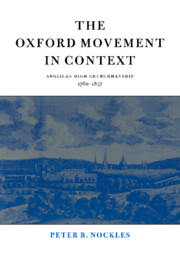Book contents
- Frontmatter
- Contents
- Preface
- List of abbreviations
- Historiographical introduction
- 1 Church and state: the politics of High Churchmanship
- 2 Antiquity and the rule of faith
- 3 Ecclesiology: the apostolic paradigm
- 4 Spirituality, liturgy and worship
- 5 The economy of salvation: sacraments and Justification
- 6 The old High Churchmen and Tractarians in historical relation
- Conclusion
- Select bibliography
- Index
Conclusion
Published online by Cambridge University Press: 23 September 2009
- Frontmatter
- Contents
- Preface
- List of abbreviations
- Historiographical introduction
- 1 Church and state: the politics of High Churchmanship
- 2 Antiquity and the rule of faith
- 3 Ecclesiology: the apostolic paradigm
- 4 Spirituality, liturgy and worship
- 5 The economy of salvation: sacraments and Justification
- 6 The old High Churchmen and Tractarians in historical relation
- Conclusion
- Select bibliography
- Index
Summary
'We have advanced … but it has been in spite of the Movement of 1833, and not through it or by it.’ Charles Drury's comment to G. A. Denison might seem to undervalue the Tractarian achievement, but it represented a common mid-century view among old High Churchmen which only the later ascendancy of Tractarian historiography eclipsed. In the 1850s Edward Churton advocated a quiet ‘rebuking of the upstart self-satisfied spirit’ of the Tractarians whom, he complained, had been ‘preaching up their noble selves, as if … knowledge would die with them’. In truth, the significance of 1833 in the annals of the nineteenth-century Church of England has been misunderstood. The Tractarians sharpened a sense of High Church party identity in the Church, but they did not and could not create it. In their church principles, sacramental teaching, spirituality and even political theology, they owed more than they usually acknowledged, not only to the Caroline phase of the High Church tradition but to the eighteenth- and early-nineteenth-century witnesses to that tradition. But 1833 was in another sense a genuine watershed. For Tractarianism diverged both spiritually and theologically from old High Churchmanship. Thus Tractarian historiography was mistaken in suggesting that the Oxford Movement first rediscovered ‘Anglicanism’ and that what became known as ‘Anglo-Catholicism’ was a natural or lineal evolution.
The damaging consequences fostered by the later course of the Movement should not be underestimated.
- Type
- Chapter
- Information
- The Oxford Movement in ContextAnglican High Churchmanship, 1760–1857, pp. 307 - 327Publisher: Cambridge University PressPrint publication year: 1994



